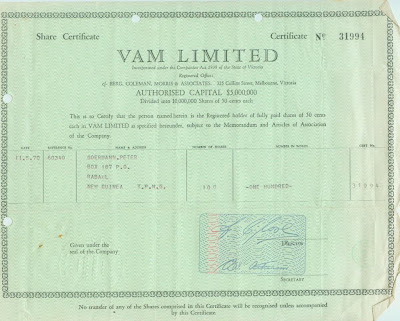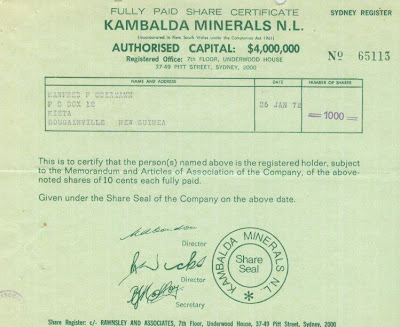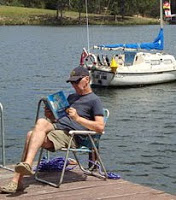I was sceptical until the last moment.
It was Eino who had heard about him and had contacted the man's brother in Sweden who confirmed that the story was true.
He had read the story in a book by a Danish travel writer. It was about a modern-day Swedish Robinson Crusoe who was said to live alone on a tropical island to the north of Australia. A real Jack London figure who had left Sweden more than 50 years ago and had lived a life of adventure as a sailor, pearl fisherman, crocodile hunter and hermit.
"It sounds like a piece of fiction" I said. "That sort of things doesn't happen anymore. It's as dead as the brontosaurus. It's just the boy inside all of us that still dreams of such adventures."
But Eino could produce evidence that this modern-day Swedish Robinson Crusoe existed. He had contacted the man's brother, a Viktor Brand, a farmer who had lived all his life on a farm in Simlångsdalen in Sweden. Viktor confirmed that he had a brother named Gösta who had left Sweden fifty-one years ago.
He had received the occasional short letter and card from his adventurous brother. The last one had been postmarked "Thursday Island", but that was more than a year ago. He thought he had been sick. Maybe he wasn't even alive any more.
Just in case we ever got as far as Thursday Island and found our modern-day Swedish Robinson Crusoe, we recorded a greeting from Viktor on Eino's tape recorder.
Thursday Island was almost as far away from Sweden as one could get. Our first stop after a long international flight was Sydney in Australia, then a domestic flight to Horn Island in the Torres Strait between Australia and New Guinea. Then a short ferry ride across to Thursday Island. (There was also a Friday Island nearby which made me think of Robinson Crusoe again) We had brought with us the cassette recording of Viktor's greetings and a bunch of family photos.
The community on Thursday Island was as large as a Swedish fishing village. It reminded me somewhat of Byxelkrok on the island of Öland. The population consisted mainly of coloured people, not Australian aborigines but South Sea islanders from Melanesia. There were no racial barriers as there seemed to be on the Australian mainland.

On our very first evening on the island we freely mixed with snooker-playing and beer-drinking blacks and whites alike in the hotel bar and were able to ask questions about Gösta. Nobody knew a Gösta Brand but they had heard of an old Swede called Ron Brand who lived on Packe Island, an hour away from Thursday Island by fast boat. But he was supposed to be seriously ill, and nobody knew if he was still alive.
Next day the postmaster confirmed that Ron was identical with Gösta - Gösta had simply been too difficult to pronounce for the local people. Two hours later we were on our way to Packe Island in a small boat owned by a South Sea Islander. About twenty minutes into our bumpy ride he yelled, "There is his boat! I am sure he is on it!"

At the risk of capsizing our little dinghy and turning us into shark-food, Eino took out his camera and started filming. The boat, an average-sized sailing boat with an auxiliary motor and a dinghy tied to her stern, lay at anchor a few hundred metres off Horn Island. We spotted the bare torso of a man inside the cockpit who disappeared into the cabin as we approached.
"I think he is sick," mumbled our boatman. However, as we got closer, he re-appeared from the cabin and we saw an emaciated, wiry, brownish man wearing a slouch-hat as protection against the sun.
I called out in Swedish, "Are you Gösta Brand? We have come from Sweden to bring you greetings from your brother Viktor."
He answered in a mixture of Swedish and "Sailor's English." Yes, he was Gösta Brand. He lived on Packe Island but had anchored his boat here because he was ill and had wanted to come a bit closer to civilisation. He thought it was his lungs, but he wasn't interested to go to a hospital. And he definitely didn't want our help to return to Sweden!
" I would die on the spot," he laughed. "I have lived far too long in the tropics. If I should die, it has to be on my island or on the boat here."
He was friendly and happy and not at all unsociable as we had anticipated. We suggested that he should follow us out to his island, so that we could film him there. He didn't seem unwilling but was probably too sick to be in front of a camera and also afraid of leaving his boat. With the help of a bottle of whisky he finally agreed to wait for us until the next day when we would come back in a larger boat to tow him back to his island.
Next day we managed to hire a twin-engined speedboat that bounced along at more than 30 knots. I helped Ron lift the anchor and sat next to him in his boat while we were towed out to sea, with Eino filming from the speedboat. It turned out to be a more dramatic film than we had anticipated as the waves became bigger and wilder until they completely drenched us and filled the dinghy with water. Close to capsizing, we desperately waved our arms to tell the speedboat to turn back.
We were wet, depressed and angry as we dropped Ron and his boat back in the same spot where we had found him. So much for our efforts to film this modern-day Robinson Crusoe's existence on his tiny island!
I don't know whether it was the influence of the whisky or the prospect of appearing on Swedish television but suddenly Ron did agree to leave his boat and come with us to his island in our speadboat. "As long as you bring me back here afterwards," he said.
An hour later, after having passed other deserted islands, we stepped ashore on a South Sea island straight out of a "Boy's Own" setting. The calm waters of the bay in front of Packe Island were absolutely clear and blue, and the sand was soft all the way up to the palm trees. Palm trees that Ron had planted himself while he had built his hut and the bamboo fence surrounding it. The hut was painted white and had a roof of corrugated metal. For almost twenty years he had lived here totally alone after having cleared a piece of land and the beach in front of it. For all this he paid a peppercorn rent of ten dollars a year to the Australian government.
He regretted that a group of cultured-pearl farmers had moved in at the other end of the bay. We thought he would have welcomed having some other people nearby but he regarded them as trespassers on his island.
He told us about the many adventures he had had and showed us some nasty scars on his legs from crocodile bites. He had become an Australian citizen and for the last few years had been getting a government pension which took care of all his material needs. But he still went crocodile-hunting on occasions or fished for barramundi, always accompanied by a native from one of the other islands. "They are my best mates," he said.
On the beach sat his canoe, named "Minnehaha"", meaning "Laughing Water" in some Red Indian language. Yes, he had lived amongst Red Indians, too. That was in Canada, before he came to Australia.
"Why did you choose this life?" we asked.
"Because I love my liberty!" he answered quickly and without hesitation. He had obviously considered this question many times.
"Didn't you ever miss a woman?"
"Yes, of course, but then I also have to get hold of a woman. I have never lived with a woman. I love my liberty!"
It sounded self-assured but by the time we had finished our filming and were to leave, we thought we knew the price he had paid for his freedom - what he called his "liberty" - and his carefree existence. He had seemed strangely touched by our visit as we recorded his message to his brother in Sweden.
"You are both welcome to come back and stay on my island," he said as we were about to depart. "Bring your wife and kids with you."
We could tell that he meant what he said although he knew quite well how unlikely another visit would be. Not many people ever come this far.
I had one last look into the cabin of his boat before I climbed down the rail. There were three guns, two with telescopic sight, a cracked mirror, an old radio, some cans and a pair of old-fashioned spectacles. The sum total of his life, plus loneliness, hardship, and the occasional sickness.
As we left, the outline of where he sat in the boat waving goodbye was getting smaller and smaller. Very soon it would be hard to believe he existed at all.
But both Eino and I had the tooth of a crocodile he had given us to prove that he was real!























































